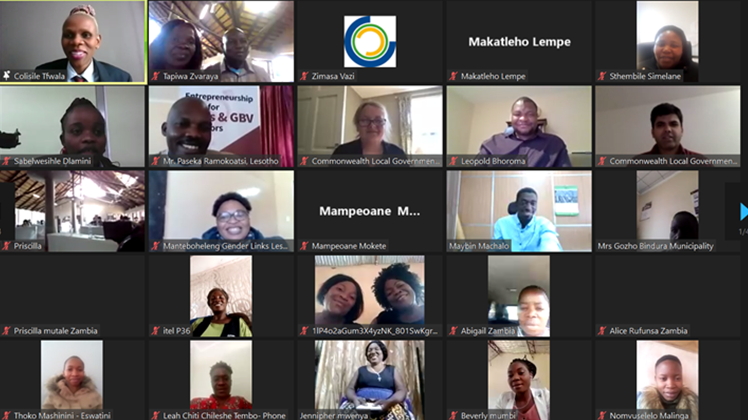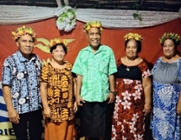Navigating the effects of COVID-19 on women entrepreneurs

09 September 2021
Women throughout the world are under-represented in major areas of society; not only government, but also business. CLGF, together with Gender Links, has established the Women in Local Economic Development networks in Eswatini, Lesotho, Zambia and Zimbabwe, as part of the Connecting the Dots project, funded by UK Aid through the Jo Cox Memorial Fund. Within the respective countries, the project has enabled these networks of women entrepreneurs to provide an invaluable source of support, though capacity building, training and mentorship, business development, access to finance and markets and, of course, through building contacts.
As the project nears its conclusion, women in business was the subject of one of the three regional dialogues held this week. 2021. Under the theme of building resilience against COVID-19, the members of the networks discussed the challenges and opportunities of their business operations during the global pandemic. The local governments in the four countries also shared how they are currently working to support local businesses during this difficult time.
Challenges faced by female entrepreneurs
Mr Paseka Ramokoatsi from Gender Links highlighted that many women in Lesotho run survivalist enterprises that have been greatly impacted by the pandemic as boarder closures have limited their ability to import products, increased expenses due to the COVID-19 tests required for inter-country travel, and have lost many customers, as many people lost their jobs.
Building business resilience
From the discussions, it is clear that the impact of COVID-19 has changed the business landscape at an accelerated rate. As pressure mounts, entrepreneurs have been forced to build resilience through adapting to the current circumstances. Ms Abigail Chipetha from Zambia and Ms Nancy Mbaure from Zimbabwe both lamented how lockdown restrictions forced them to change their business models to diversify revenue streams, as their previous business operations were prohibited for long periods.
COVID-19 opportunities
Conversely, the pandemic has also provided opportunities for certain industries. One example is Ms Minnenhle Dlamini, an informal agro-processing entrepreneur from Eswatini, who found that the COVID-19 pandemic was actually a great opportunity for her, since the cayenne pepper sauce that she produces has health benefits and so she was able to market her sauce as an immune system booster. Instead of relying on importing inputs, she grows her peppers and also sources them from local markets. She added that, being part of the Connecting the Dots project has also supported her with business development, networking, confidence building, branding and marketing – all extremely important to the viability and future of a business. Due to her success, Ms Dlamini is now working to expand her product range.
Local government support for women during the pandemic
The CEO of Siteki Town Council in Eswatini explained that support for women during the pandemic is firmly rooted in the council’s local economic development strategy: “We have provided entrepreneurship training; supported waste reclaimers with PPE materials and equipment, constructed a waste sorting site and a buy-back centre; provided land and equipment to small-scale farmers; purchased computers to ensure internet access to the community; and also provided assistance with business registration.”
In Zambia, Ms Leah Chiti Chileshe-Tembo from Kafue Town Council said that, in order to mitigate the impact of the pandemic, women have been provided with land and infrastructure access to water for agricultural purposes. Mr Stephen Chibindi, Administrator of Manyame Rural District Council in Zimbabwe described how women have been supported through empowerment initiatives; infrastructure has been approved; and women have also been provided with access to local markets, each district now has an economist to assist with local economic development.
What more can local governments do
Although local government has made strides in supporting female entrepreneurs, there is still more support required, and much more that the local government can do.
More capacity building, with training and mentoring is a given, but so too is access to funding. Finance is one of the biggest challenges for business women.
In order for women to continue to innovate as they have during the pandemic, they need support to feel confident and empowered. This includes feeling able to embrace the digital world and be supported to use online and e-commerce and e-trading opportunities. Local government support with the establishment of e-commerce platforms to extend the e-trading space would be invaluable. This should be available to both the formal and informal businesses, but it is important to formalise all businesses, as so many of the activities of women entrepreneurs fall into the informal category.
Market research and understanding women’s needs are crucial, and link to the need for diversification and flexibility. Agriculture is a key sector in this regard as it puts the focus on the use and processing of local resources.
Decentralisation is key to local governments being able to support LED meaningfully and this requires a review of policy and legislation so that it is fully responsive to current trends. It is very positive to see a new Ministry of Enterprise in Zambia with women preparing projects and business proposals, ready for its inauguration.
As well as all the tangible benefits, the project has clearly shown the value of these networks and support mechanisms and they must be developed and strengthened.
Supporting those providing support
A key point that emerged is that local governments also require additional support to enable them to better support female entrepreneurs. During discussions, numerous speakers mentioned:
- the need to establish local economic development departments within local authorities;
- strengthening local governments' capacity to undertake ward profiling and also local resource mapping; and
- the devolution of appropriate responsibilities to local government to enable them to collect revenue for use in the local community.
There was also a call for LED to have a budget allocation within local authorities.
Similar to the other network dialogues held this week, as part of the Connecting the Dots Project, members of the LED networks agreed that the project was a great success and unanimously called for a continuation of the work currently being undertaken by the Women in Local Economic Development Networks in all four countries. Even though much has been achieved by the project todate, a lot must still be done.
Back to News





